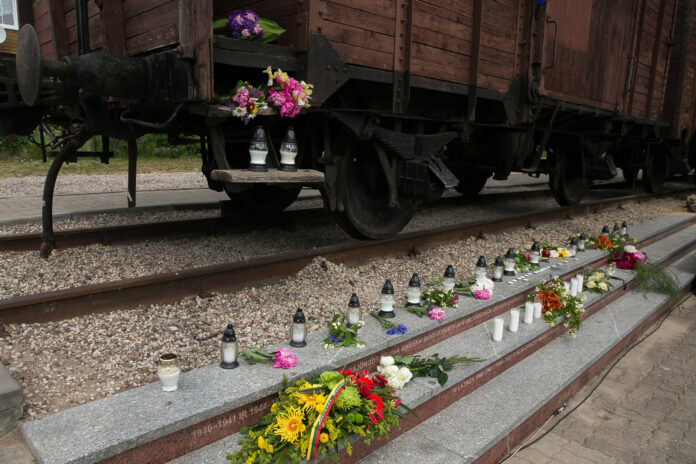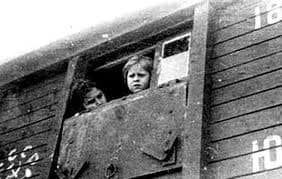
Commemoration Day of Victims of Communist Terror in Lithuania
 On June 14, 1941, the Soviet Union began mass deportations of Lithuanian citizens to Siberia. Most of the 17,485 Lithuanians deported that night were taken mostly into exile and to prison camps in the GULAG. Many politicians of the day as well as activists, including the second president of Lithuania, Aleksandras Stulginskis, were deported. In all, Lithuania lost 130,000 of its citizens in this way.
On June 14, 1941, the Soviet Union began mass deportations of Lithuanian citizens to Siberia. Most of the 17,485 Lithuanians deported that night were taken mostly into exile and to prison camps in the GULAG. Many politicians of the day as well as activists, including the second president of Lithuania, Aleksandras Stulginskis, were deported. In all, Lithuania lost 130,000 of its citizens in this way.
Every year on this day commemorations take place throughout Lithuania and Lithuanian communities in the diaspora. Candlelight vigils, religious services, concerts and many other events are organized to remember the atrocities inflicted on innocent people.
This year in Toronto, the Baltic Federation in Canada is organizing a vigil at Nathan Phillips Square on Tuesday, June 14, at 7:30 PM. Everyone is invited to participate.
Last year, the Federation published this very important statement for the 80th anniversary of the event. The message is all the more poignant considering the events taking place in Ukraine today.
Canadians, with Estonian, Latvian and Lithuanian roots, remember the unpunished war crimes against their peoples and nations. In this age of cyber and hybrid warfare, in which Canada and its allies are a direct target, the perpetrators of horrendous atrocities and their neo-Soviet successors are rewriting the historical narrative, denying and falsifying the truth. Evidence hidden in archives is being closed to research. Historians and researchers are now threatened with severe criminal punishment for delving into the past. The truth must be told.
Beset by three invasions, the Baltic peoples endured unimaginable suffering. Neither Nazi Germany nor their Soviet allies had any benevolent plans for the region following the Hitler-Stalin alliance of 1939. Colonization and genocide were the order of the day. The Molotov-Ribbentrop Pact defined the alliance between Nazi Germany and the Soviet Union, essentially dividing up Europe into their own spheres of influence and allowing the conquest of their neighbours. The result of this heinous pact led to World War Two.
Today we mark 80 years of tragic memories for families who had to endure three brutal occupations of their native lands, Estonia, Latvia and Lithuania. Their struggle for freedom, democracy and survival is not stuck in the past as a faint footnote, but a reminder that ethnic cleansing and mass murder must not be tolerated by a civilized world. Nevertheless, wide-spread criminal aggression continues.We are witnessing repeated crimes against humanity in Syria, in occupied Eastern Ukraine and Crimea, and continuing threats of attack against the Baltics.The first Soviet invasion of Estonia, Latvia and Lithuania took place in 1940. The year that followed was marked by a reign of terror, torture, murder of intelligentsia, community leaders and military, culminating in the first mass deportation on the night of June 13-14, 1941. Tens of thousands of Baltic families were suddenly rounded up, forced into cattle cars, and transported to the furthest reaches of Siberia. There was no mercy for women, children, the elderly, the infirm or even infants. Many died along the way from starvation, illness and mistreatment. Others would be executed at their final destinations. This horrifically crude attempt at genocide would continue into the 1950s with further arrests and deportations, especially March 25-28, 1949 when more than 90,000 were taken and sent off to slave labour and concentration camps. Hardly a Baltic family was left untouched by the loss of loved ones, friends and neighbours.
We Remember!






























